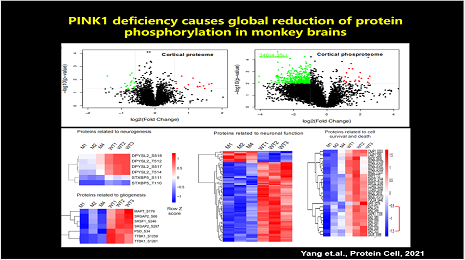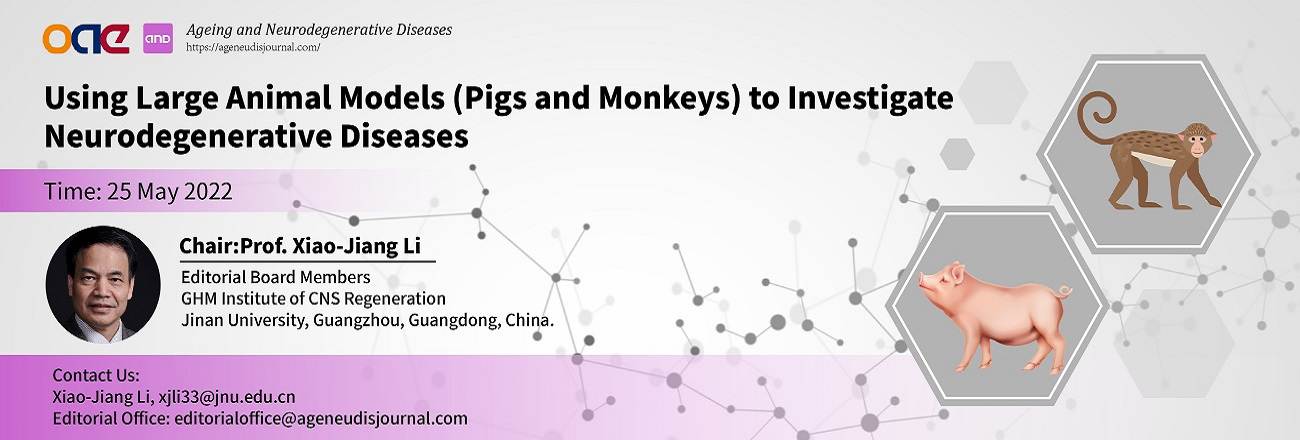Contents
Chair(s)

Wei-dong Le
Editor-in-Chief of Ageing and Neurodegenerative Diseases
Vice Dean of Medical School, Professor & Director of Neurology Department & Institute, Sichuan Academy of Medical Science-Sichuan Provincial Hospital, Chengdu, Sichuan, China.
Vice Dean of Medical School, Professor & Director of Neurology Department & Institute, Sichuan Academy of Medical Science-Sichuan Provincial Hospital, Chengdu, Sichuan, China.

Xiao-Jiang Li
Ph.D. Oregon Health & Science University, Portland, USA (1991)
Postdoctoral fellow at Johns Hopkins University, USA (1991-1995)
Faculty at Emory University, USA (1996-2019)
Distinguished Professor of Human Genetics at Emory University, USA (2007 -2019)
Professor at Jinan University, Guangzhou, China (2017-present)
Prof. Li current research fields include use of genetically modified animals (mouse, pig, monkey) to investigate the pathogenesis of important brain diseases and to develop their treatments. Prof. Li has published more than 200 SCI papers with more than 27430 citations and an H index of 86.
Postdoctoral fellow at Johns Hopkins University, USA (1991-1995)
Faculty at Emory University, USA (1996-2019)
Distinguished Professor of Human Genetics at Emory University, USA (2007 -2019)
Professor at Jinan University, Guangzhou, China (2017-present)
Prof. Li current research fields include use of genetically modified animals (mouse, pig, monkey) to investigate the pathogenesis of important brain diseases and to develop their treatments. Prof. Li has published more than 200 SCI papers with more than 27430 citations and an H index of 86.
Speaker(s)

Sen Yan
GHM Institute of CNS Regeneration, Jinan University, Guangzhou, Guangdong, China.
Topic: Using gene knock-in pig model to investigate HD
Dr. Yan completed her Ph.D. and postdoctoral training at Emory University/Chinese Academy of Sciences and is currently a researcher at GHM Institute of CNS Regeneration at Jinan Univerisy, PhD supervisor, winner of National Outstanding Youth Fund, Young Scientist Program of National Key R&D Program, and Youth Pearl River Scholar.
She is committed to the molecular level research of central nervous system diseases. Her research team has successfully established the world's first Huntington, knock-in pig model, ALS transgenic pig model, and Alzheimer's monkey models, etc., she is experienced in the establishment and mechanism analysis of large animal disease models as well as gene therapy research for large animal models of neurological diseases.
She has publications as the first or corresponding author in authoritative journals such as Cell, Human Molecular Genetics, Molecular Neurodegeneration, etc. Additionally, she has presided over the National Natural Science Foundation of China major research programs (cultivation projects), general projects, Guangzhou key research and development programs and other projects.
Topic: Using gene knock-in pig model to investigate HD
Dr. Yan completed her Ph.D. and postdoctoral training at Emory University/Chinese Academy of Sciences and is currently a researcher at GHM Institute of CNS Regeneration at Jinan Univerisy, PhD supervisor, winner of National Outstanding Youth Fund, Young Scientist Program of National Key R&D Program, and Youth Pearl River Scholar.
She is committed to the molecular level research of central nervous system diseases. Her research team has successfully established the world's first Huntington, knock-in pig model, ALS transgenic pig model, and Alzheimer's monkey models, etc., she is experienced in the establishment and mechanism analysis of large animal disease models as well as gene therapy research for large animal models of neurological diseases.
She has publications as the first or corresponding author in authoritative journals such as Cell, Human Molecular Genetics, Molecular Neurodegeneration, etc. Additionally, she has presided over the National Natural Science Foundation of China major research programs (cultivation projects), general projects, Guangzhou key research and development programs and other projects.

Weili Yang
GHM Institute of CNS Regeneration, Jinan University, Guangzhou, Guangdong, China.
Topic: Genetically modified monkey model to investigate PD
Researcher, GHM Institute of CNS Regeneration, Jinan University (2019)
Ph.D., Institute of Genetics and Developmental Biology, Chinese Academy of Sciences (2017)
Emory University, USA, visiting scholar (2018.11-2019.08)
University of California, Los Angeles, visiting scholar (2017.07-2018.10)
Dr. Yang is dedicated to the establishment of non-human primate monkey models for major diseases and their pathological mechanisms. She established various gene modified monkey models, such as Parkinson's disease, Duchenne muscular atrophy, autism, and cerebellar disease. Combined with her working experience, she presided over the general project of the National Natural Science Foundation of China, the general project of Guangdong Province, and is the key co-investigator of the Research and Development Plan in Key Areas of Guangdong Province.
She has published 10 SCI papers as the first or corresponding author in authoritative journals, such as Cell Research, Protein Cell (2021, 2022), Journal of Neuroscience, Molecular Neurodegeneration, Human Molecular Genetics. She has applied for 3 invention patents. Dr. Yang is Editorial board member of Frontiers in Aging Neuroscience. Also, she also was invited to be a reviewer of Neuroscience Bulletin, Journal of Genetics and Genomics, Neurosignals, Developmental Biology, etc.
Topic: Genetically modified monkey model to investigate PD
Researcher, GHM Institute of CNS Regeneration, Jinan University (2019)
Ph.D., Institute of Genetics and Developmental Biology, Chinese Academy of Sciences (2017)
Emory University, USA, visiting scholar (2018.11-2019.08)
University of California, Los Angeles, visiting scholar (2017.07-2018.10)
Dr. Yang is dedicated to the establishment of non-human primate monkey models for major diseases and their pathological mechanisms. She established various gene modified monkey models, such as Parkinson's disease, Duchenne muscular atrophy, autism, and cerebellar disease. Combined with her working experience, she presided over the general project of the National Natural Science Foundation of China, the general project of Guangdong Province, and is the key co-investigator of the Research and Development Plan in Key Areas of Guangdong Province.
She has published 10 SCI papers as the first or corresponding author in authoritative journals, such as Cell Research, Protein Cell (2021, 2022), Journal of Neuroscience, Molecular Neurodegeneration, Human Molecular Genetics. She has applied for 3 invention patents. Dr. Yang is Editorial board member of Frontiers in Aging Neuroscience. Also, she also was invited to be a reviewer of Neuroscience Bulletin, Journal of Genetics and Genomics, Neurosignals, Developmental Biology, etc.
<h3 id="<em>AND</em> Seminar I" class="webinar-header "><em>AND</em> Seminar I
AND Seminar I: Using large animal models to investigate neurodegenerative diseases
- Time (Beijing, UTC+8)
- Speakers
- Activity
- 20:00-20:05
- Wei-dong Le
- Welcome remarks and introduction of Dr. Xiao-Jiang Li
- 20:05-20:15
- Xiao-Jiang Li
- Introduce the background and significance of the seminar
- 20:15-20:35
- Sen Yan
- Using gene knock-in pig model to investigate HD
- 20:35-20:55
- Weili Yang
- Genetically modified monkey model to investigate PD
- 20:55-21:00
- Xiao-Jiang Li
- Q & A session
Moments

















